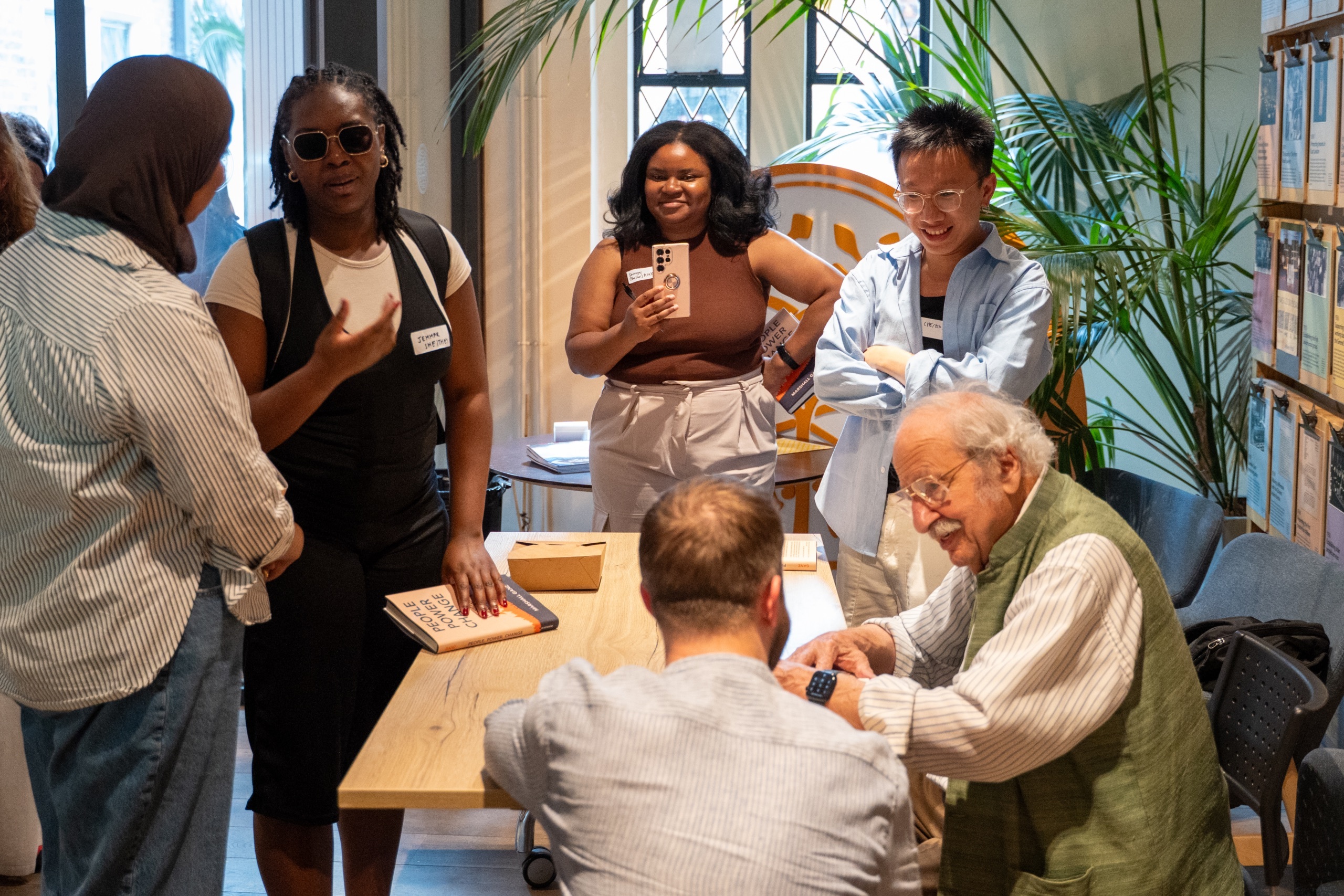Voices
People Power Change – Marshall Ganz's UK Book Launch
Insights from the UK launch of Marshall Ganz's new book, People Power Change, and discussion hosted by Act Build Change.
Act Build Change | 28 May 2025
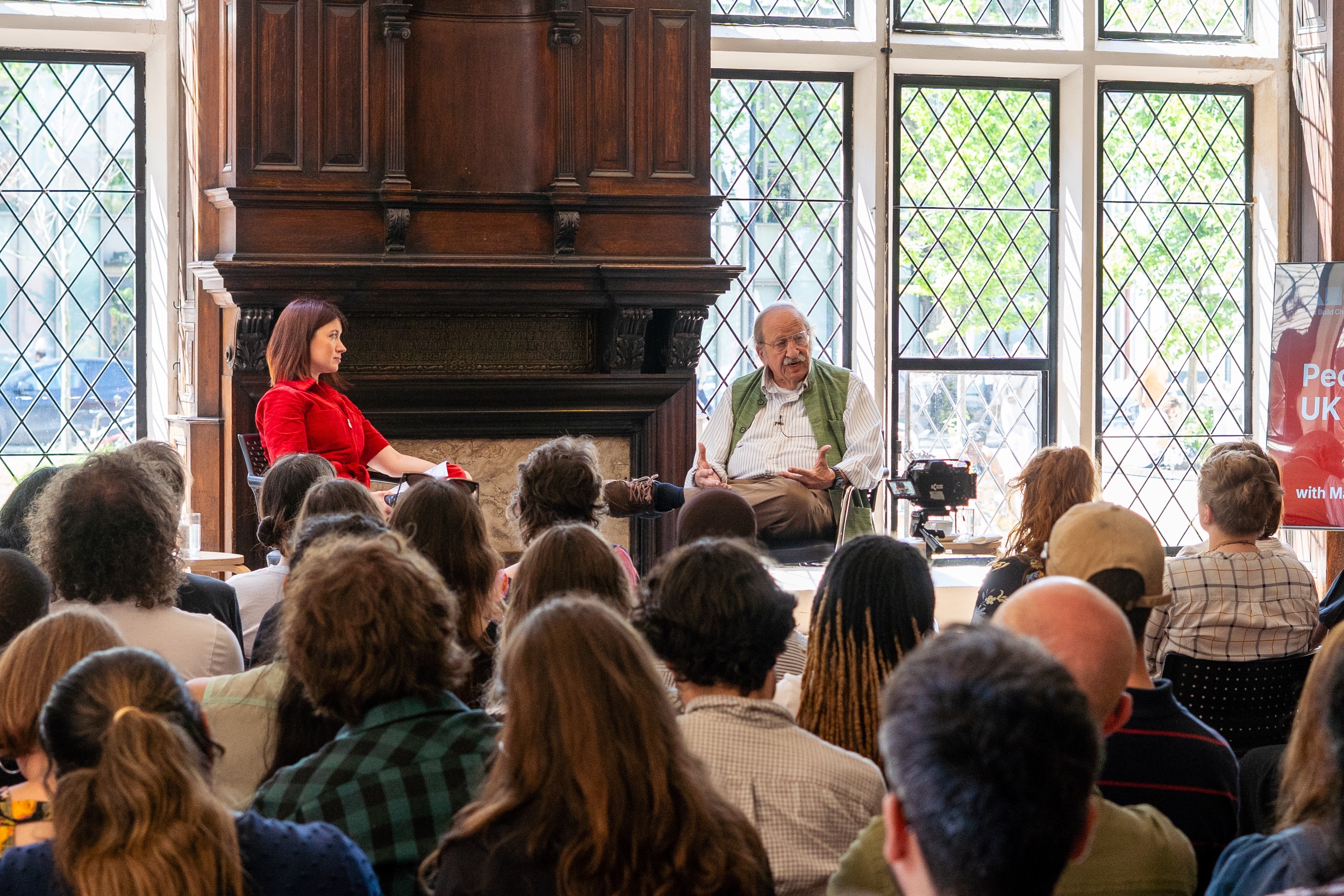
This post uses affiliate links which means that when you buy an item using the link provided we receive a portion of the sale. Affiliate links are marked with a ⟡
About the book
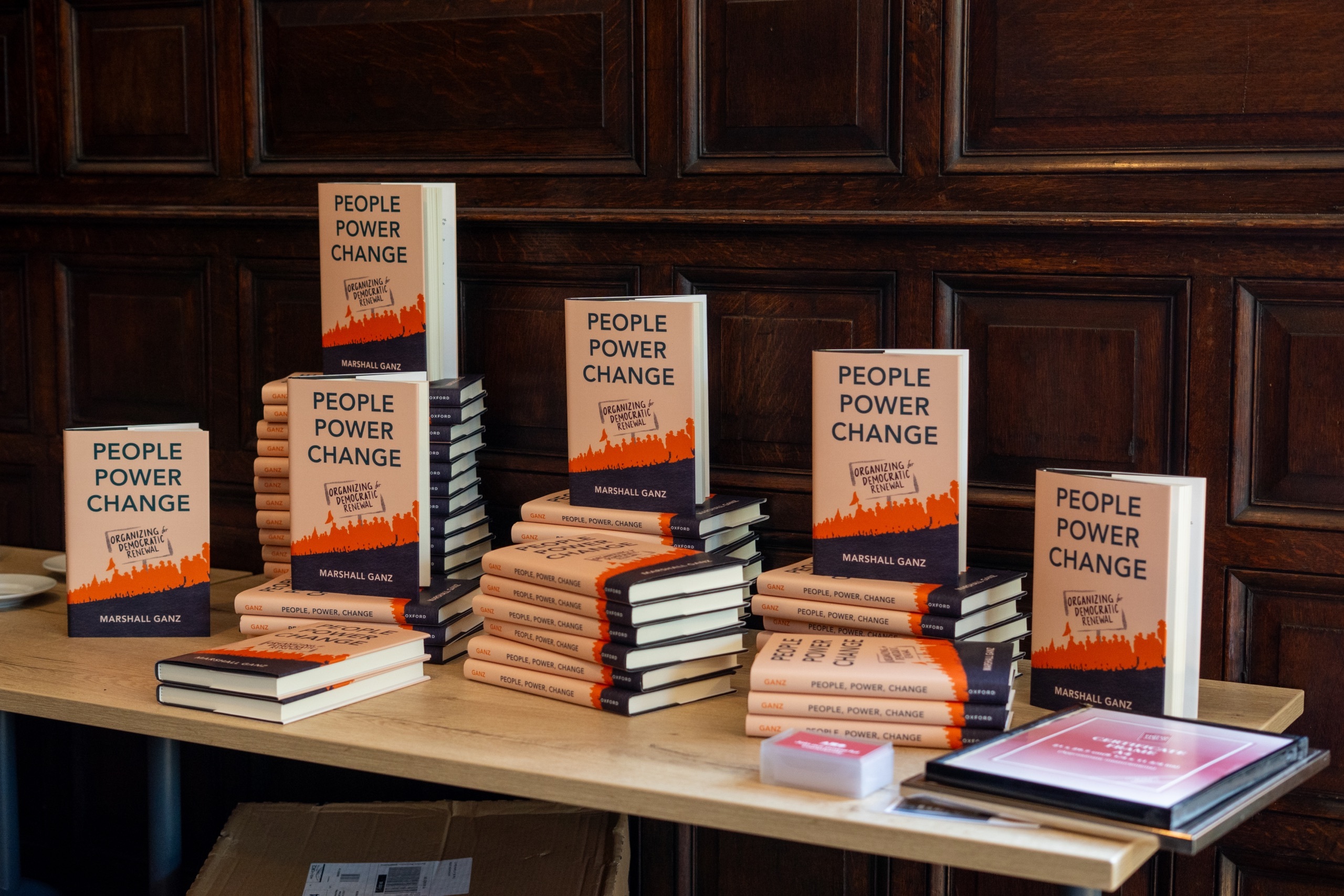
Marshall Ganz offers practical wisdom in his new book, People, Power, Change: Organizing for Democratic Renewal. Drawing from a half-century of experience, Ganz presents community organising not as feel-good activism, but as a rigorous discipline for building democratic power from the ground up. In an era marked by political upheaval, social fragmentation, and growing inequality, the question of how ordinary people can create meaningful change has never been more urgent.
Marshall Ganz is a veteran organiser who worked alongside the civil rights movement, the United Farm Workers, led the grassroots organising effort of Barack Obama presidential campaign, and is a lecturer at Harvard Kennedy School.
Buy People, Power, Change: Organizing for Democratic Renewal from Bookshop.org.
The 'Solidarity Sauna'
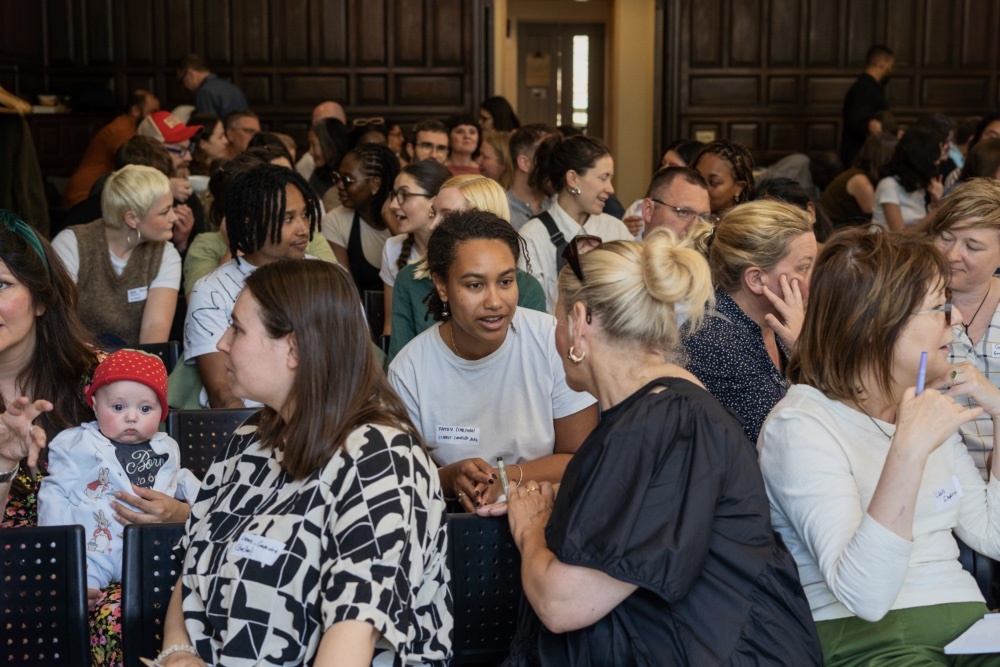
Earlier this month, we had the honour of hosting Ganz for the UK launch of his new book. One of the organisers called our action the ‘Solidarity Sauna’ – and on such a warm day with a packed room, it certainly felt like one!
We brought together 100 organisers from across the UK. People traveled from Wales, Scotland, and all corners of England, representing diverse causes – from tackling poverty and the climate crisis to advancing racial, queer, and migrant justice. The room itself told a beautiful story – our youngest participant was just four months old, our eldest 82, with seasoned organisers sitting alongside others just starting their journey in this work.
What struck us most was how naturally everyone connected because, as Ganz reminds us, effective organising isn't really about the specific issues we work on – it's about our shared belief in people's power to challenge oppression and create the change we need to see in the world.
Amidst the raw stories of struggle, we were also led in a freedom song by Amina Gichinga, ‘si se puede’ claps, and celebrated stories of our wins. It created the kind of space where organisers could really reflect on what this work means to them and how they want to contribute to our collective struggle.
I didn’t leave the event thinking, “that was another nice event.” I left thinking, “what’s next?” Many of us come into this work with beautiful, caring hearts. But the system wears us down. We lose ourselves. That’s why this event mattered so much. I left with a deep sense of responsibility.
This is the heart of what Ganz encourages us to do – ‘staying grounded in our practices’, building ‘brave spaces for mutual learning’, sharing stories to ‘confront fear with hope’, starting ‘with the power you do have, and grow from there’, and most importantly be ‘each other's teachers, not each other's judges.’
A rock bottom moment
Watch Marshall's opening address at the book launch.
Ganz began by naming that we are in a ‘rock bottom moment’. From Trump's return to office, Reform's electoral gains, to the steady growth of fascist ideology across the globe – the challenges facing democratic societies appear overwhelming. Just one day prior to our action, Labour announced radical reforms to the UK immigration system through their white paper, which contained a troubling shift towards keeping migrants in prolonged precarity and denying them security.
Yet, Ganz argues that such moments of crisis creates unique potential for transformation – not merely tweaking old systems, but forcing us to rethink them entirely.
Countering far right narratives were being dispersed in questions throughout the day. It was evident fear, anger and apathy was in the room. ‘Fear’, Ganz highlighted, is always the first problem. Or, in reference to one of his favourite sci-fi series, Dune, it is the ‘mind-killer.’ It is an emotion used intentionally to disrupt our organising and prevents us from committing to action. Marshall argued that you don’t counter fear by telling someone ‘don’t be afraid’, instead, ‘you counter fear with hope.’
When the future is unpredictable, neither optimism nor pessimism really helps. In fact, both are arrogant – they both pretend to know how it all ends.
Hope, on the other hand, is realistic. Hope lives in that space between certainty and fantasy. It's the space where imagination, creativity, and strategy can thrive.
This understanding of hope as active practice, rather than passive waiting, forms the cornerstone of Ganz's approach to organising. Hope, he insists, is not something you have but something you do. Hope is a verb requiring constant cultivation through relationships, narrative, and collective action. It is not waiting out there for who will save us or provide a five point plan. This underestimates our own capacity, experience, resources and relationships. Ganz says, ‘organising has always been about working with others to reclaim that voice, that agency, that dignity – and turn it into power.’
People
Relationships form the foundation of all organising work, but Ganz was careful to distinguish real relationships from client transactions. As Ganz described, ‘real relationships involve commitment and without commitment there is no relationship. Commitment gives the relationship a future to build power, learning, and solidarity.’
Commitment distinguishes organising from other forms of social change engagement. As Ganz noted, ‘being over engaged and under committed just spreads our resources, our valuable time, and our ability to commit and build real power.’ This insight speaks to the scattered nature of much contemporary activism, where people respond to every crisis in mobilising flashes without building the deep, sustained relationships necessary for systemic change. Or, as Hahrie Han shared at one of our events last year – too much of our organising has turned people into ‘ATMs for ballots, bucks, and bodies.’
Our field has become so concerned with, ‘what is our issue’, that we've forgotten the, ‘who are our people’. When we truly commit to relationships, we put people at the center of everything we do. It's so easy to get caught up in our causes – becoming ‘the climate person’ or ‘the housing person’ – but when we do that, we risk losing sight of the human beings we're working alongside. Issues and beliefs matter, but they're not the starting point. When it does we turn people into abstractions. Reducing people into ‘person A’ or ‘person B’ is a dehumanising exercise. The starting point should be understanding what drives people, what brings them pain, hope and what supports them to thrive.
Focusing on the values we share as people and our commitment to act on those values means wrestling with hard questions together and to approach our differences with genuine curiosity rather than quick judgement. It means to show up consistently for each other and to hold ourselves accountable to what we're building.
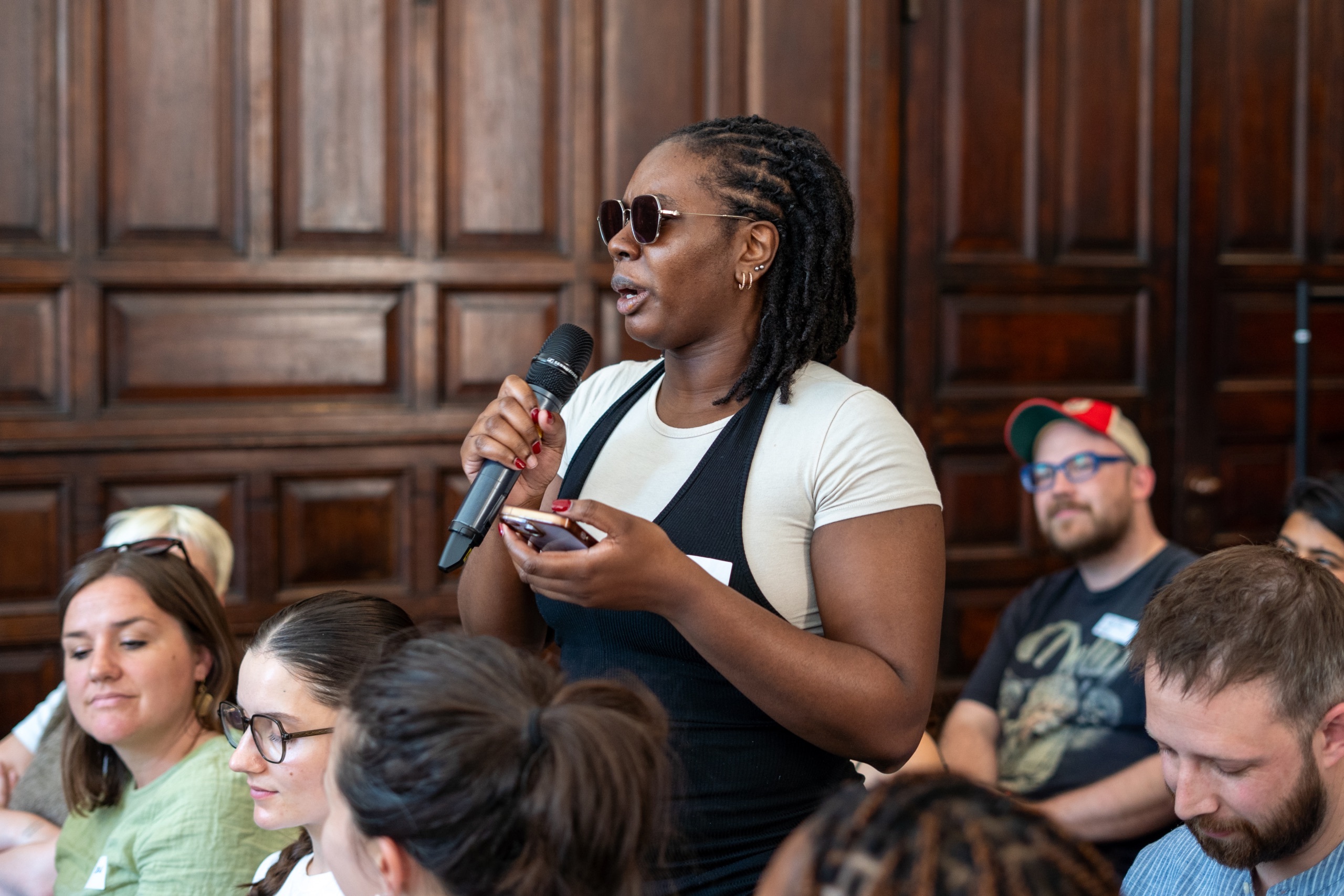
A moving moment was when Jemmar, Founder of Collective Punishment, shared challenges around feeling overwhelmed and isolated in their organising – particularly as someone who has lived experience of the issue they are organising around. Rather than offering quick fixes, Ganz asked probing questions to gain a deeper understanding of their experience. Ganz landed by saying, ‘so maybe your next step is to build real relationships with those who are supporting, not just watching. Let them carry some of this burden with you. You’re doing this from a place of pain and power. That’s valid. That’s real. But you don’t have to do it alone. You shouldn’t do it alone. Build the collective that this work deserves.’
When Beth from UNISON asked how we can support new organisers in growing and staying committed to this work, Ganz stated that the key is staying rooted in the fundamentals of organising—approaching it as something we're always learning and adapting, not as a perfect formula we need to master.
Beyond building genuine relationships and staying open to different perspectives, we need strong stories. Our narratives are how we make sense of the disruptions and challenges we face. Good stories are emotional containers that hold our deepest values. They help us transform moments when everything feels chaotic, into clear moments of choice, and then to meaningful action that reflects what we truly care about.
When someone seems to be pulling back from organising or struggling with accountability, Ganz reminds us to return to these basics. That's where real coaching becomes essential – being there for people when they hit moments of doubt, frustration, or are feeling burned out. It means asking the important questions and having honest conversations. Ganz reminds us that being over engaged and under committed just spreads our resources, our valuable time, and our ability to commit and build real power.
Power
Central to Ganz's organising philosophy is a fundamental reframing of what power really is – ’power is not a thing you have; it's an influence created through interdependence’.To bring this idea to life, he posed a simple question to the room: ‘If I've got something you need, more than you have what I need – who has the power?’ Fingers pointed to Ganz. ‘Ok,’ he continued, ‘now what if it is the other way around, and you've got something I need, more than what I have that you need – who has the power?’ This time, hands turned inward – nearly a hundred people pointing to themselves. The power shifted.
This moment illustrates a central insight: power doesn’t come from titles or possessions; it comes from relationships – specifically, the dynamics of need and resource. Power flows from our interdependence. And when those interdependencies are mutual, they can be a source of shared strength. But when one party controls the resources others rely on – and uses that control to override others’ choices – that’s domination. The task of organising, Ganz argues, is to shift relationships of dependency into relationships of shared power.
In the room were organisers working to move beyond traditional models of service delivery, toward building lasting community power. Rae, a seasoned organiser at Trussell asked, ‘how do we navigate the tension between service delivery and building power? Specifically, how can national food bank networks – where many communities are accustomed to receiving support – begin organising those same communities as active constituencies capable of shaping change?’
Ganz answered plainly that this tension is, at its core, about power. ‘Most inequalities we see – economic, racial, ecological – are fundamentally expressions of unequal power’, he said. And that understanding reshapes how we pursue change. ‘You cannot give people power – they have to take it’, he emphasised. ‘The goal isn't just to help communities but to help them build their own capacity for collective action. That means taking risks, stepping into leadership, and often, making sacrifices.’
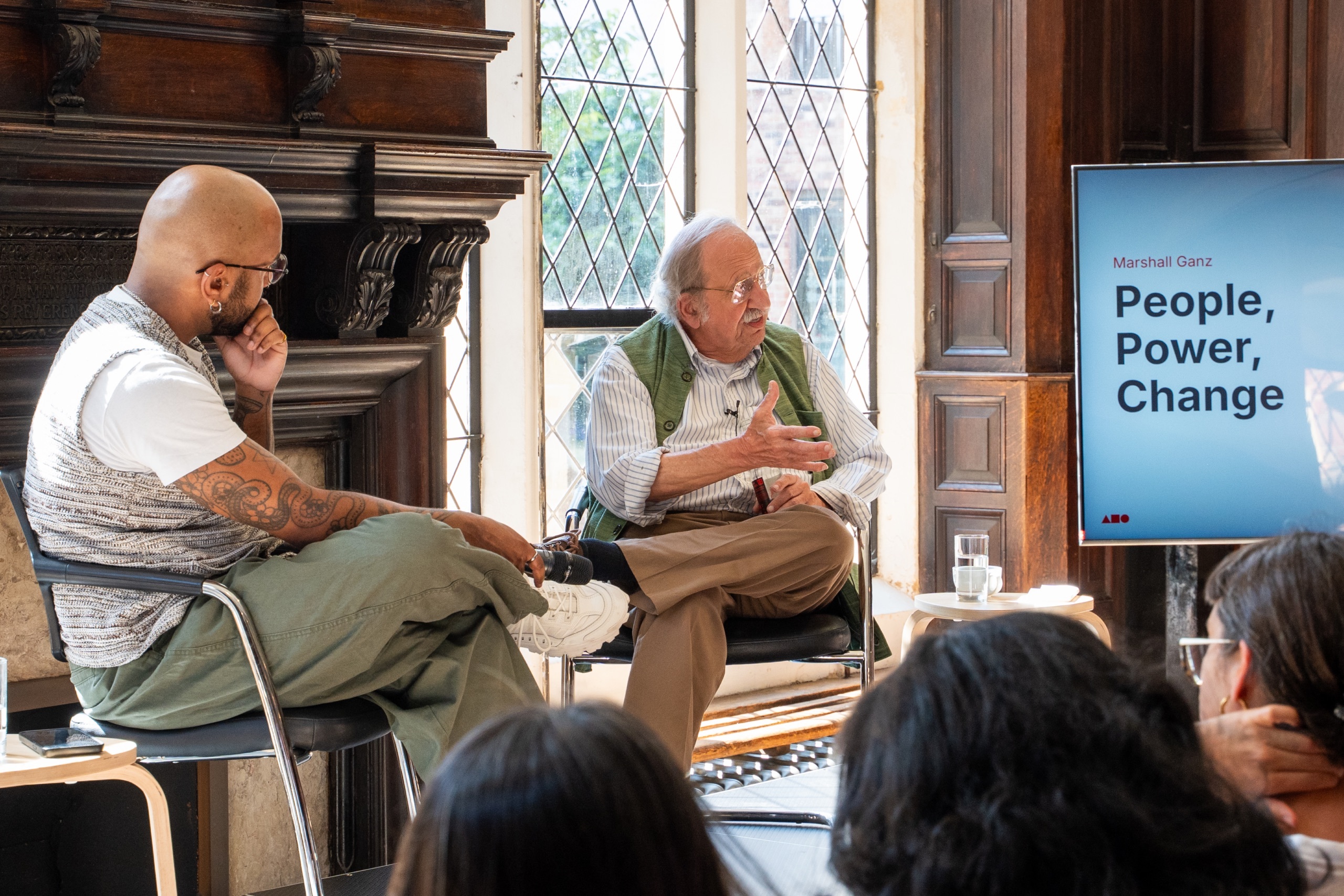
There’s a fundamental difference between treating someone as a client and recognising them as a constituent. Providing services and building collective power are not the same. As Ganz put it, ‘organising is about enabling people to speak for themselves. It's not a charity project. It's a justice project.’
Change
Organisers in the room spoke candidly about the difficult balance we hold – pushing the system toward the world we believe in, while confronting the painful reality that politics can cut against what we believe in and undermine our trust. The issues we organise around are urgent and have real life consequences. That urgency compounds a constant feeling – that we’re never doing enough.
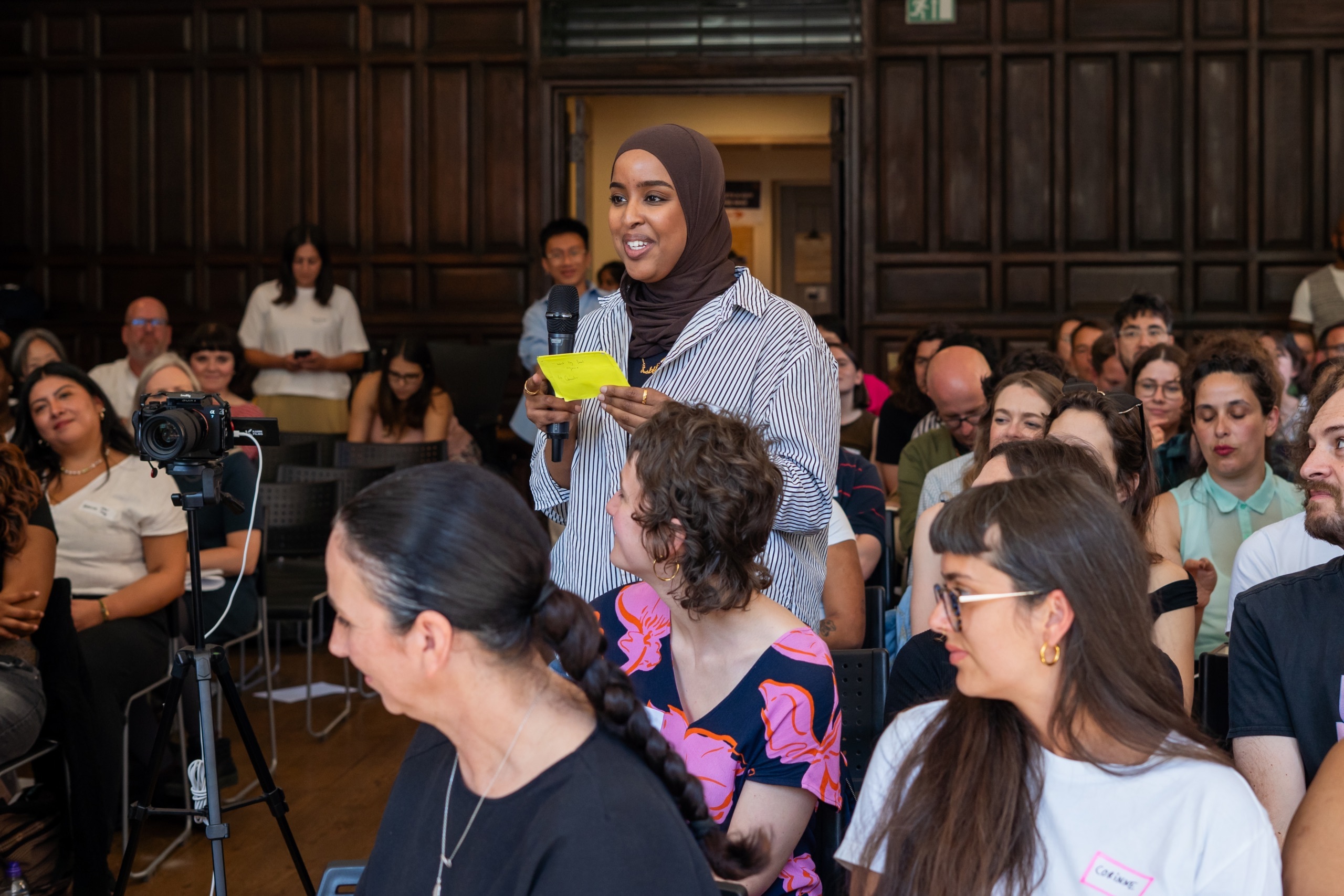
Fatima from Green New Deal Rising asked, ‘When the “good guys” become the “bad guys”, and are still the only viable electoral option, how do we maintain hope and mobilise effectively? How do we convince people to pressure a government that’s failing us, when the alternative is the far right? How do progressives confront that when organising is centralised in London and is dominated by middle-class narratives, it is often alienating the very communities we need to reach?’
Central to Ganz’s response to Fatima was the reminder that it's okay to admit when something isn’t working – but that recognition should lead to strategic rethinking, not resignation. It’s about reclaiming our agency, together. He emphasised that movements are essential to a functioning democracy. ‘In the US, meaningful change – from abolition to civil rights – has never come from elected officials alone. It came from movements creating pressure, often from outside formal politics. Electoral politics must be accountable to this movement building.’
Another attendee, Charlotte Fischer of Love and Power, shared a powerful reminder that the responsibility and opportunity for organisers to drive change remain constant, regardless of who is in power.
The role of the elected party changes as they enter government, but our role as organisers does not.
Ganz also spoke directly to the systems that shape political participation and how they differ, ‘I know here in the United Kingdom, people will complain about their parties, but they actually have an organisation where you can go to a meeting and you can nominate your person to be in Parliament. You can go to a conference and choose who’s going to be the leader. We’ve never had representative democracy [in the US]; at best, we’ve had a republic that’s kind of an oligarchic republic. We’re the only liberal democracy that has no constraints on campaign spending – that the Supreme Court said money is speech. No other liberal democracy has that; they all have campaign constraints.’
Throughout his career, Ganz has held a thoughtful and often critical relationship with electoral politics. While he worked on Barack Obama’s campaigns and deeply values civic participation, he’s also clear-eyed about its limits. He reflected on the Obama administration’s missed opportunities for radical system change, and the Harris campaign’s failure to truly hear voters – ‘telling voters how they ought to feel rather than listening to how they really felt.’
The solution, according to Ganz, lies not in abandoning electoral engagement but in maintaining the independence and pressure that movements provide.
The time is now
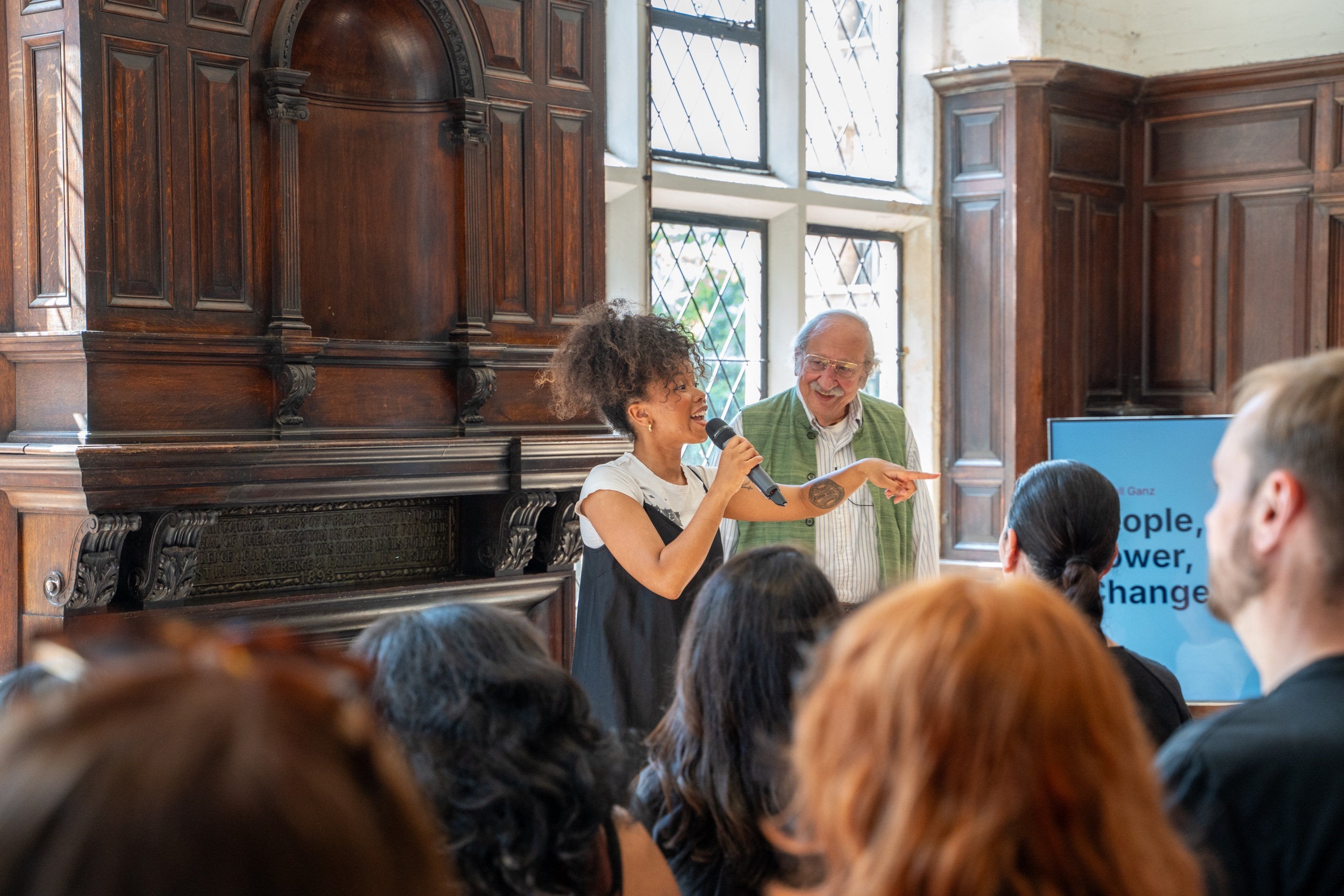
Ganz’s words resonated deeply in the room. But it was in the conversations between organisers – in breakouts and spontaneous exchanges that went on till 8.30 in the evening after the action was over – that strategy, solidarity, and commitment to the path ahead began to take shape.
In closing, Ganz shared lyrics from a song by Judy Collins:
Freedom never came like a bird on the wing,
Never came down like rain in spring,
Freedom, freedom, what a hard won thing,
You've got to work for it, fight for it,
Day and night for it,
And every generation has got to win it again.
He signed each book with the reminder: ‘The Time is Now.’
Marshall Ganz offers both urgency and possibility. The work of building people power for democratic change cannot wait for better circumstances or clearer paths forward. It must begin with the relationships, stories, and commitments we can build today. Because, as he reminds us, ‘every generation has got to win it again.’
